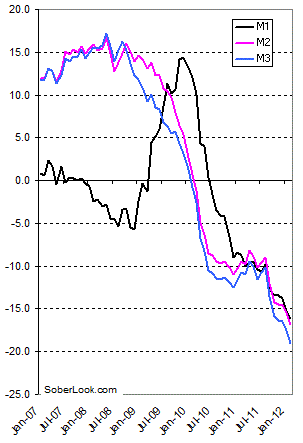By Luis Arroyo, in Madrid | The ECB has lost all his monetary gunpowder, as this has become fragmented. In this graph I saw recently on the Greek money supply, monetary aggregates M1 M2 and M3 have collapsed. Deposits are falling, like savings accounts and time deposits. However, the monetary base or the money issued by the ECB is the same for everyone.
 What happens is that in normal countries the banking sector does not experience problems to expand its assets (loans), what results in an increase in deposits. The multiplier effect works. But what happens when the multiplier is different from one country to another? Shouldn’t the ECB be extremely careful to avoid this? This indicates that the money that banks absorb in these countries (Spain, for example) are not multiplied: it either goes to bank reserves, or it goes away.
What happens is that in normal countries the banking sector does not experience problems to expand its assets (loans), what results in an increase in deposits. The multiplier effect works. But what happens when the multiplier is different from one country to another? Shouldn’t the ECB be extremely careful to avoid this? This indicates that the money that banks absorb in these countries (Spain, for example) are not multiplied: it either goes to bank reserves, or it goes away.
The truth is that the normal circuit is broken. With those drops in liquidity, the economy must necessarily turn into depressed territory. It is a problem we cannot solve by cutting fiscal expenditure, as we seem to have promised. And this fragmentation is growing.
An ECB that can not determine the money supply according to the base and/or interest rates, is a dead ECB.





Be the first to comment on "The European Central Bank is dead"